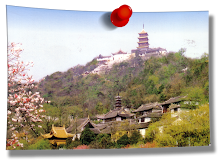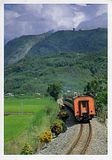
 Porto, also Oporto in English, is Portugal's second city and capital of the Norte NUTS II region. The city is located in the estuary of the Douro river in northern Portugal. The largest city in the region, Porto is considered the economic and cultural heart of the entire region. The city, which had an estimated population of about 220.000 (est. 2008), lies at the centre of the political Greater Metropolitan Area of Porto, with a population of slightly more than 1,7 million (est. 2008), and is the main agglomeration of northern Portugal. The city of Porto comprises 15 civil parishes.
Porto, also Oporto in English, is Portugal's second city and capital of the Norte NUTS II region. The city is located in the estuary of the Douro river in northern Portugal. The largest city in the region, Porto is considered the economic and cultural heart of the entire region. The city, which had an estimated population of about 220.000 (est. 2008), lies at the centre of the political Greater Metropolitan Area of Porto, with a population of slightly more than 1,7 million (est. 2008), and is the main agglomeration of northern Portugal. The city of Porto comprises 15 civil parishes.One of Portugal's most internationally famous products, Port wine, is named after the city because it is produced in, and shipped from the area or, more precisely, from Vila Nova de Gaia, a city just across the river which belongs to the same conurbation. The country was also named after the Latin name of Porto, Portus Cale.
Porto district is one of the most industrialised districts in Portugal, and Maia, one of Porto's satellite cities, has the largest industrial park in Portugal. The historic centre of Porto was declared a World Heritage Site by UNESCO in 1996. The World Heritage site is defined in two concentric zones; the "Protected area", and within it the "Classified area". The Classified area comprises the medieval borough located inside the 14th-century Romanesque wall.
Porto district is one of the most industrialised districts in Portugal, and Maia, one of Porto's satellite cities, has the largest industrial park in Portugal. The historic centre of Porto was declared a World Heritage Site by UNESCO in 1996. The World Heritage site is defined in two concentric zones; the "Protected area", and within it the "Classified area". The Classified area comprises the medieval borough located inside the 14th-century Romanesque wall.































No comments:
Post a Comment